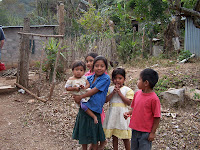 The CELL group completed their language immersion and home stay experience in Copan and traveled tothe highlands of Quimistan (Honduras) on Friday, January 27th. They took part in an orientation with trip leader Aaron Banas and then headed to the rural community of Brisas del Mar to meet their host families and get an introduction to Sustainable Harvest's (SHI's) program. SHI is a small non-profit organization providing farming families in Central America with training and tools to improve quality of living while restoring the environment. We have been working in Honduras since 1997 and the group will get a chance to see the impact of our programs while working alongside Honduran agronomists and families on a variety of volunteer projects.
The CELL group completed their language immersion and home stay experience in Copan and traveled tothe highlands of Quimistan (Honduras) on Friday, January 27th. They took part in an orientation with trip leader Aaron Banas and then headed to the rural community of Brisas del Mar to meet their host families and get an introduction to Sustainable Harvest's (SHI's) program. SHI is a small non-profit organization providing farming families in Central America with training and tools to improve quality of living while restoring the environment. We have been working in Honduras since 1997 and the group will get a chance to see the impact of our programs while working alongside Honduran agronomists and families on a variety of volunteer projects.Aaron sends saludos from the group and says that they are enjoying the time with the families and over the weekend helped to plant organic pineapples and cassava. Quimistan is known for producing delicious coffee and the group will get a chance see how SHI is working with farmers to inter-crop coffee with spices under a canopy of native hardwood trees. In addition to providing families with nutritious and marketable crops, these multi-story forest plots mimic the natural forest, protect watersheds and provide important wildlife habitat. The group will also likely get a chance to see how coffee is planted, harvested, depulped and roasted - so as you sip your morning cup this week, think of them in the coffee highlands of Honduras!
The village of Brisas del Mar doesn't have electricity and cell phone access is limited so I don't expect another message from the group for a few days... They'll be departing the rural communities on Thursday of this week and then traveling on to their next program site - Fundacion Simiente in the South of Honduras.
